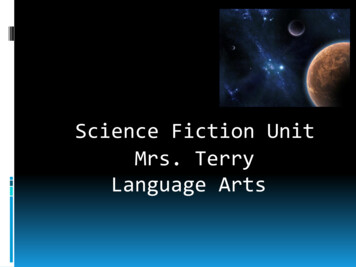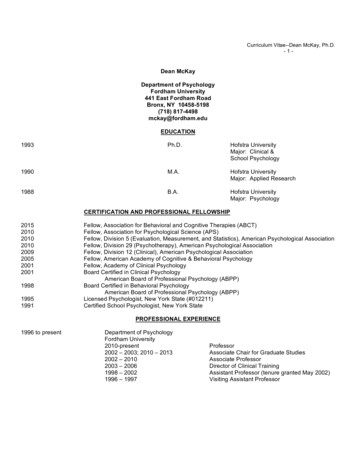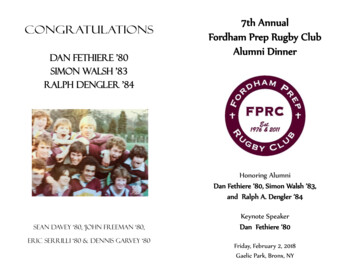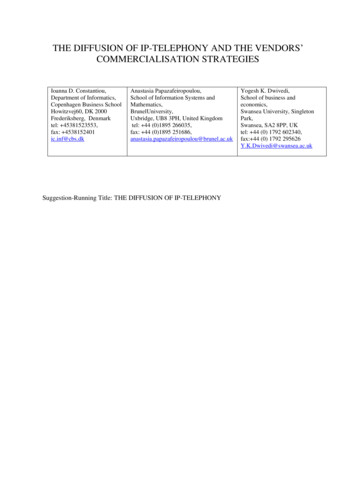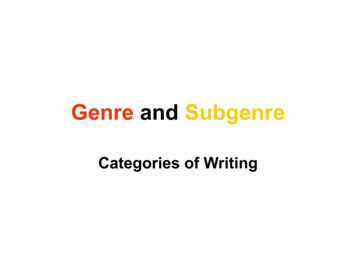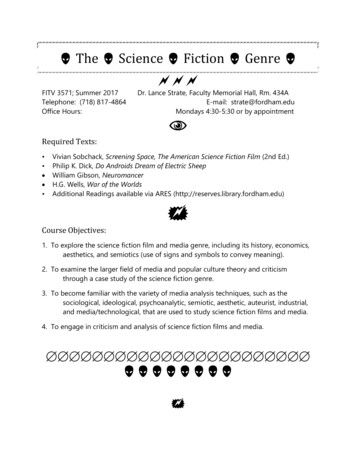
Transcription
The Science Fiction Genre FITV 3571; Summer 2017Telephone: (718) 817-4864Office Hours:Required Texts: Dr. Lance Strate, Faculty Memorial Hall, Rm. 434AE-mail: strate@fordham.eduMondays 4:30-5:30 or by appointment Vivian Sobchack, Screening Space, The American Science Fiction Film (2nd Ed.)Philip K. Dick, Do Androids Dream of Electric SheepWilliam Gibson, NeuromancerH.G. Wells, War of the WorldsAdditional Readings available via ARES (http://reserves.library.fordham.edu)Course Objectives: 1. To explore the science fiction film and media genre, including its history, economics,aesthetics, and semiotics (use of signs and symbols to convey meaning).2. To examine the larger field of media and popular culture theory and criticismthrough a case study of the science fiction genre.3. To become familiar with the variety of media analysis techniques, such as thesociological, ideological, psychoanalytic, semiotic, aesthetic, auteurist, industrial,and media/technological, that are used to study science fiction films and media.4. To engage in criticism and analysis of science fiction films and media.
2Evaluation:1. Participation. Participation will account for 25% of the final grade. You areexpected to attend our weekly class meetings), to arrive on time and attend the full classsession, and to participate sensibly based on the readings and other assignments, andto participate in our online discussions in a timely and sensible fashion.2. Papers. You will be required to write two papers for this class in which you engage inanalysis of some aspect of the science fiction genre, drawing on the assigned readings,screenings, etc., and additional sources. The papers will be graded based on quality andoriginality of the analysis, as well as basics such as spelling, grammar, etc. Papers shouldbe at least 1500 words in length, not including references. The first paper will be due onJuly 24th and the second on August 7th. Each paper will account for 25% of your finalgrade.3. Final Examination. There will be a final examination based on the readings,screenings, and class discussion, which will account for 25% of your final grade.Academic integrity is the pursuit of scholarly activity in an honest, truthful, andresponsible manner. Violations of academic integrity include, but are not limited to,plagiarism, cheating on exams, falsification, unapproved collaboration, and destructionof library materials. For more information on what specifically constitutes violations ofacademic integrity and the university’s policy toward violations of academic integrity,see: ity .If you believe that you have a disabling condition that may interfere with your ability toparticipate in the activities, coursework, or assessment of the object of this course, youmay be entitled to accommodations. Please schedule an appointment to speak with meimmediately or you may go to the Office of Disability Services (O’Hare Hall on the LowerLevel, 718.817.0655). Under the Americans with Disabilities Act and Section 504 of theVocational Rehabilitation Act of 1973, all students, with or without disabilities, areentitled to equal access to the programs and activities of Fordham University. Tentative Schedule
3July 5 July 6 July 10 July 11 July 12 July 13In Class Meeting: Introduction to the ClassIn Class Screening: Edison’s Frankenstein (Dawley, 1910)In Class Screening: A Trip to the Moon (Méliès, 1902)Online: Spectacle and the City of the FutureScreening Due: Metropolis (Lang, 1926)In Class Meeting: The Science Fiction Genre, Analysis & CriticismReading Due: H.G. Wells, War of the WorldsOnline: Panic AttackListen Online: War of the Worlds radio broadcast (Welles, 1938) http://www.mercurytheatre.info Reading Due: Heyer, “America Under Attack” (on ARES)Online: Alien Invasion Then and NowScreening Due: War of the Worlds (Haskin, 1953)Screening Due: War of the Worlds (Spielberg, 2005)Reading Due: Sontag, “The Imagination of Disaster” (on ARES) Online: Alien MonsterScreening Due: The Thing from Another World (Nyby, 1951) Screening Due: Sobchack, Introductory material and Chap. 1July 17In Class Meeting: Alien MessiahScreening Due: The Day the Earth Stood Still (Wise, 1951)Reading Due: Sobchack, Chap. 2 July 18 July 19 July 20 Online: Alien Invasion and Monsters from the IdScreening Due: Invasion of the Body Snatchers (Siegal, 1956)Screening Due: Forbidden Planet (Wilcox, 1956)Online: Future VisionsScreening Due: 3 Star Trek episodes “The City on the Edge of Forever”(Season 1), “Who Mourns for Adonais?,” & “The Apple,” (Season 2)Screening Due: Alphaville (Godard, 1965) Online: The Science Fiction Art FilmScreening Due: 2001: A Space Odyssey (Kubrick, 1968)
4July 24 July 25 July 26In Class Meeting: From Art to EntertainmentReading Due: Sobchack, Chap. 3Screening Due: Star Wars (Lucas, 1977)Screening Due: E.T.: The Extra-Terrestrial (Spielberg, 1982)Online: The Horror HybridScreening Due: Alien (Scott, 1979)Screening Due: Videodrome (Cronenberg, 1982) Online: Paranoid VisionsScreening Due: Blade Runner (Scott, 1982/1991) Reading Due: Dick, Do Androids Dream of Electric SheepJuly 27Online: Time Lines and LoopsScreening Due: La Jetée (Marker, 1962)Screening Due: The Terminator (Cameron, 1984)Screening Due: Frequency (Hoblit, 2000) July 31 Aug. 1 Aug. 2 Aug. 3 Aug. 7In Class Meeting: SciFi Soap Opera and PostfuturismScreening Due: Wild Palms (Stone, 1993)Reading Due: Sobchack, Chap. 4Online: Cyberspace and CyberpunkIn Class Meeting: Gibson, NeuromancerScreening Due: The Matrix (Wachowski & Wachowski, 1999)Online: Cyberspace and Cyberpunk 2Screening Due: Avatar (Cameron, 2009)Screening Due: Inception (Nolan, 2010)Online: SyFy on Cable TelevisionBrowse Online: http://www.syfy.comScreening Due: Battlestar Galactica (Moore, 2004) episode "33"In Class Meeting: Final Exam
5 About This Course This course was originally a film class, but has been broadened to consider the science fictiongenre across a variety of different media, especially television, and also including books, comics,magazines, theater, radio, and digital media.
6There are several reasons why it is worthwhile to study the science fiction genre. First, sciencefiction offers opportunities for thought experiments, allowing scientists and social scientists toimagine possible future developments in science and technology, and to consider theirconsequences. Second, as a form of popular entertainment, science fiction tends to reflect itsaudience’s values, beliefs, and attitudes, fears and aspirations, ideologies and mythologies. Bystudying science fiction as a form of popular culture, we can uncover the source of its appeal toand influence on audiences, and gain greater understanding of ourselves as human beings,individually and collectively. Third, as a film genre, we can use science fiction to betterunderstand the motion picture, one of the oldest and most prestigious of the audiovisual media,and the medium that presents us with the most extended and complex forms of visualcommunication. The study of film provides one of the best methods for gaining visual literacy, askill of increasing importance for mass media consumers and practitioners alike.The study of genre or category is one way to approach the study of film and popular culture. Acourse such as Hollywood Genres tends to survey and compare a number of different genressuch as the western, the detective story, and the war movie. This course, on the other hand,provides the alternative of focusing on one particular genre, and studying its history,development, and continuities over time. While the object of study is narrower than many othercourses, the critical methods and skills involved, and the experience of in-depth study, are easilytransferred to other subject areas.Although the science fiction genre has often been disparaged, it does have a respectablepedigree: some scholars trace its origins to Jonathan Swift’s Gulliver’s Travels, or to ThomasMore’s Utopia, or even to Plato’s Republic; most, however, place its birth in 1818 with thepublication of Mary Shelley’s Frankenstein. Science fiction blossomed in the late 19th century,mostly due to the efforts of Edgar Allan Poe, Robert Louis Stevenson, Arthur Conan Doyle, JulesVerne, and H.G. Wells. And while the genre was not taken seriously in literary circles during theearly 20th century, it did gain increasing popularity, especially in the United States through thepublication of pulp magazines such as Amazing Stories, edited and published by HugoGernsback, who is credited with coining the term science fiction in 1929 and after whom theHugo Awards are named, and Astounding Stories (now known as Analog), whose best-knowneditor was John W. Campbell, Jr. Some of the writers publishing in these magazines includeEdgar Rice Burroughs, Robert A. Heinlein, Arthur C. Clarke, A. E. van Vogt, Theodore Sturgeon,Frank Herbert, Ursula K. Le Guin, and Isaac Asimov, the most prolific author in American historywith over 500 books to his credit. During the mid to late 20th century, science fiction wasembraced by serious novelists such as Kurt Vonnegut and Doris Lessing. Science fiction themescan be found in some of the earliest motion pictures, the best known example being GeorgesMéliès’s A Trip to the Moon (1902); Fritz Lang’s Metropolis (1926) is generally considered one ofthe classics of the silent movie era. Outside of movie serials featuring heroes such as FlashGordon and Buck Rogers, however, science fiction films did not become common until afterWorld War II. Through most of the 50s and 60s the genre was dominated by B movies featuringrocketships, robots, and bug-eyed monsters, while science fiction on television largely followedthe example of the film genre. Science fiction cinema did not receive much critical attention inthe United States until 1968, with the release of Stanley Kubrick’s 2001: A Space Odyssey,
7followed, in 1971, by his A Clockwork Orange. Respectability was followed by commercialsuccess with the release, in 1977, of Close Encounters of the Third Kind and Star Wars. Sincethen, science fiction in Hollywood has become all but synonymous with special effectsblockbuster, and the profitability of these films is taken quite seriously. On television, it was notuntil a decade after Star Wars, with the premiere of Star Trek: The Next Generation in 1987, thatthe science fiction genre was considered anything other than a losing proposition. On cable, theSCI-FI Channel was launched in 1992, changing its name to Syfy in 2009. The genre has beenquite naturally been popular in various forms of new media ever since computers were used todo something other than number crunching.Since the 1980s, scholars have also begun to pay increasingly more attention to the sciencefiction genre as a form of popular culture. In particular, postmodernists, cultural theorists, andmedia ecologists have recognized science fiction’s unique concern with the problems ofmodern, technological society such as dehumanization, and the genre’s ability to speak to largersocial and global concerns, and to grapple with questions of identity, the self, and subjectivitythrough the encounter with otherness in the form of aliens and machines.This course places significant emphasis on science fiction film as opposed to other mediabecause it is through the motion picture that the genre has found its widest audience. We will,however, also consider the genre as it occurs across different media, including film adaptationsof written works, books, plays, magazines, comic books, television, cable, popular music,videogames, computer software, and websites. It is important to emphasize that this courseinvolves a significant amount of reading and writing. Even when the object of our study is filmor some other audiovisual medium, one of our main tasks is to "translate" the audiovisual forminto a verbal form, and to provide detailed criticism and analysis.For those of you who come to this course as science fiction fans, let me note that while it iswonderful to be able to study something that you really care about, and while having a greatdeal of background knowledge of the subject can be very helpful, you will not be successful ifyou approach the subject matter as a fan. You will need to develop a certain amount of criticaldistance from the material in order to engage in analysis, and to analyze your own reactions as afan. And for those of you who don’t know much about science fiction, don't worry. As outsiders,you are in a good position to criticize and analyze science fiction, and the readings and classdiscussions will provide you with all of the information you need to do well in this class. Afurther note on gender would be in order: Historically, science fiction was a male-orientedgenre, but the genre has been changing in recent decades, in regard to creators, characters, andcritics, and analysis of the genre in regard to gender and sexuality represents a significantportion of scholarly work on the genre. Finally, please note that in choosing the books and films for this class, I have tried to representdifferent historical periods, themes, trends, etc., and to match the materials to various methods
8of analysis and criticism. If your favorite movie, book, program, etc., was not included, you canstill deal with it in your papers.
the science fiction genre was considered anything other than a losing proposition. On cable, the SCI-FI Channel was launched in 1992, changing its name to Syfy in 2009. . of written works, books, plays, magazines, comic books, television, cable, popular music, videogames, computer software, and websites. It is important to emphasize that this .


